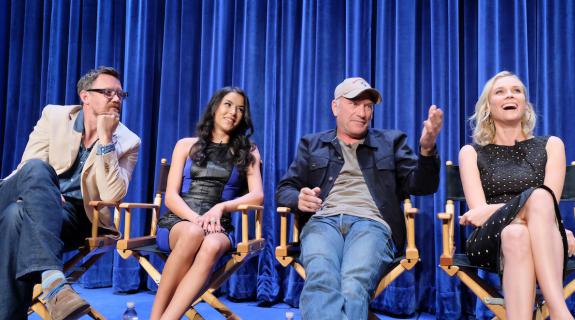[Pictured, left to right: Matthew Lillard, Emily Rios, Ted Levine and Diane Kruger at The Paley Center for Media’s “The Bridge:” Season 2 premiere screening and conversation on June 24, 2014.]
Of the many dramatic elements that transpired in Season 1 of FX’s “The Bridge,” perhaps the most dramatic was its creators’ decision to gut its primary storyline early.
Much of that first season’s momentum was fueled by the hunt for serial killer David Tate. But rather than build to a climactic final episode involving some sort of resolution with the villain, Tate was taken out of commission in episode 11, with two crucial episodes left in the 13-episode season. It was a bold move but a necessary one, according to series showrunner and co-developer Elwood Reid.
“The great thing about serial killers is, people are going to follow you,” Reid said, speaking at a panel Tuesday night at the Paley Center for Media in Beverly Hills. “But I knew if we were going to survive into the second or third season, we were going to have to pull that life support.” Based on the Scandinavian crime drama “Broen,” which also centers on a mass murderer, Season 1 of “The Bridge” followed that series’ “satisfying template,” Reid said, “and it was my job not to mess it up.” But, he went on, “we had to create a new show. We had this untapped world between these two borders.”
Reid’s appearance followed a special advance screening of the show’s Season 2 premiere (it debuts on FX July 9). Following the screening he was joined onstage by “The Bridge” co-leads Diane Kruger and Demián Bichir, as well as series regulars Ted Levine, Emily Rios and Matthew Lillard. Their discussion with moderator Michael Schneider reaffirmed the value of the show’s departure into a more nuanced, character-driven, world-building brand of storytelling.
“What I loved of [Detective Marco Ruiz] from the beginning was that he wasn’t black or white,” said Bichir. “I love characters that have different layers of emotions. When I read the pilot I saw that there.”
For Kruger, whose character Detective Sonya Cross suffers from Asperger syndrome, the challenge for Reid and the other show’s writers was “to come up with storylines that show a different side of her,” she said. Dealing with a character with Cross’ condition, she continued, “people tend to take the easy way out, but I fight for, ‘no, it’s okay to be awkward. It’s okay for not everyone to like her.’ I try to stay strong as a performer because I feel a huge responsibility to [the Asperger syndrome] community.”
“I’m just happy to be here,” chimed in Lillard, whose unhinged reporter Daniel Frye was supposed to be killed off mid-season last year.
Frye was kept alive, Reid explained, “because Matthew was so good I was like, ‘why am I going to get rid of this guy?’” Valuing strong characters over heavy-handed plot developments, Reid said he realized the dynamic between Frye and Emily Rios’ journalist character Adriana Mendez was an extremely effective way to explore issues surrounding the US/Mexico border. Committed to an authentic sense of culture and place, his show’s casting director is from Mexico City, and brings in “actors who are very specific to that area,” he said. Additionally, Reid hired “New York Times” foreign correspondent Damien Cave as a consultant on the show. An expert on border relations between the US and Mexico, Cave “takes these very complex ideas like immigration and the drug trade and he helps us shrink them down and make them dramatic.”
The results, as evidenced by the evening’s screening, felt dramatic without feeling sensational, as the characters picked up the pieces following the Tate debacle. A darkness hovered over everything, but there were no titillating shocks designed to make you gasp. That’s because, Reid said, it’s not about the destination so much as the journey.
“Everyone on this stage has a big journey this season,” he said. “The reason the surprises work so well is because you know the characters so well. It’ll be at a simmer the whole time and when you do light that match, the whole thing blows up.”
Lillard attributed the capacity for that level of nuanced storytelling to a network willing to take risks. “FX allows all that to happen,” he said. “They’ve perfected the slow burn… It takes courage to just say ‘yes’ and know people will find it.’”
Tags:













































__twocolumncontent.jpg)











